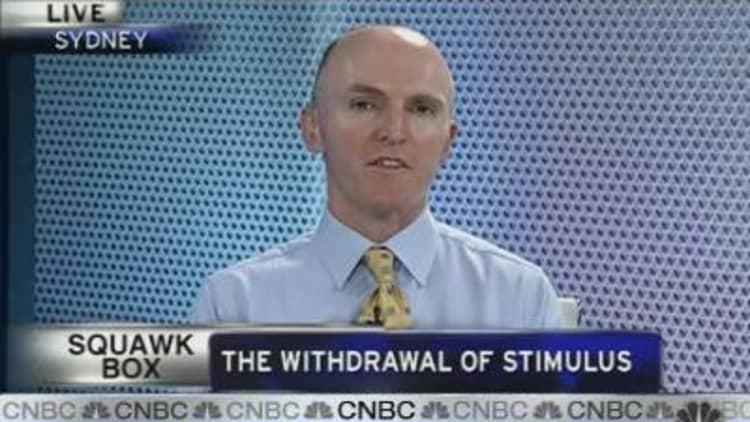The U.S. economy could face a double-dip recession next year, in the absence of stimulus measures and extended incentive programs, Kirby Daley, senior strategist at Newedge Group, said Monday.
"Without the U.S. extending stimulus, extending incentive programs in a big way, we could be in a double-dip recession in the U.S. in 2010, by the end of the 2010, putting the world economy back into a very bad state," he said.
Last week, the Federal Reserve said that exceptionally low rates would be with us for an extended period of time. In Europe, the European Central Bank hinted at a future exit strategy, saying it would not extend its liquidity-boosting program next year.
Over the weekend, Group of 20 finance ministers and central bankers met in Scotland and pledged to prepare strategies to end emergency support for their economies, but to keep the aid flowing until the recovery was assured.
The timing of the implementation of the exit strategies will be "the most important issue that we're going to be facing in the coming years," Daley said.
The removal of stimulus measures may be "a long, drawn-out process in some cases," he added.

"There will be no coordinated effort of tightening across the world. We've already seen that there aren't coordinated efforts and there cannot be."
"The question is for 2010, is there really going to be the type of economic recovery that will warrant the kind of tightening or exit strategies beginning that we're seeing in the rhetoric? Have we not gotten ahead of ourselves, even if what we're thinking is going to really play out in 2010 and 2011? And will we see those plans for early exit strategies and early rate hikes begin to be rolled back? I suspect that we will," Daley told CNBC.
Sean Callow, senior currency strategist at Westpac Bank, said there was a possibility of negative GDP in the second quarter of next year, so there is a possibility of a double-dip but "we think it'll be reasonably shallow."
Given the "ongoing contraction of consumer credit" and the "destruction of wealth of the household balance sheet," it will be "difficult to sustain the recovery," Callow told CNBC.
Experts have been skeptical of a lasting recovery in the U.S. as employment figures remain in negative territory and consumers continue to cut back on spending. But other analysts said the recovery will be stronger than expected.

